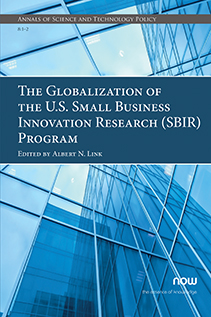Japan’s SBIR Scheme
By Masatoshi Kato, Kwansei Gakuin University, Japan, mkato@kwansei.ac.jp | Alex Coad, Waseda University, Japan
Abstract
Following the SBIR program in the U.S. in 1982, a similar program has been enacted in Japan in 1999, officially known as the Law for Facilitating Creation of New Business, but often referred to as the Japanese SBIR programme. Japan’s SBIR scheme aims to increase opportunities for SMEs with technology development capability, to receive support for their R&D, and to support the commercialization of outcomes from such activities, based on the Small and Medium-sized Enterprises Business Enhancement Act. This monograph highlights a peculiar characteristic of the Japanese SBIR scheme compared to the U.S. program, namely Japan’s SBIR recipients are relatively old.
The Globalization of the U.S. Small Business Innovation Research (SBIR) Program
The Globalization of the U.S. Small Business Innovation Research (SBIR) Program presents how SBIR programs have spread across the globe. The U.S. SBIR program has become a template for legislation in other countries that seek to enhance the innovative nature of small firms. This special issue presents works by leading eminent scholars who describe individually the population of international emulated programs. The works are ordered by the date that the country adopted an SBIR-like program, including Turkey (1995), Australia (1996), Brazil (1997), South Korea (1998), Japan (1999), Taiwan (1999), United Kingdom (2001), The Netherlands (2004), and New Zealand (2012).

Companion
Annals of Science and Technology Policy, Volume 8, Issue 1-2 Special Issue: The Globalization of the U.S. Small Business Innovation Research (SBIR) Program
See the other articles that are also part of this special issue.